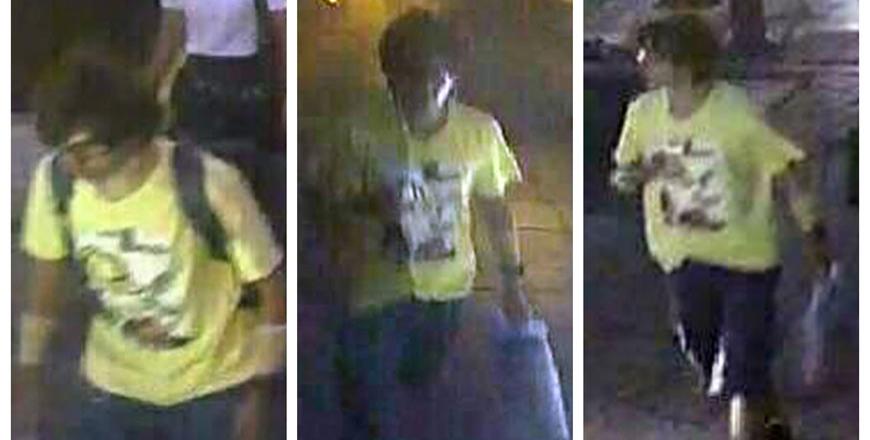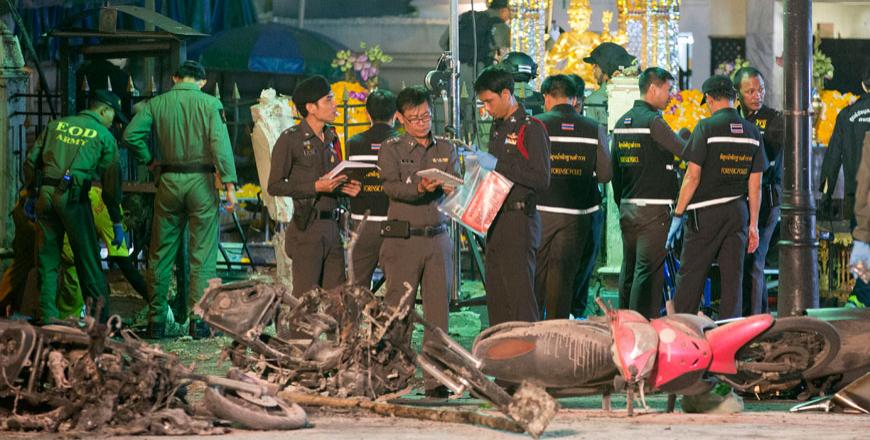You are here
Foreigner prime suspect in Bangkok bombing — authorities
By AFP - Aug 19,2015 - Last updated at Aug 19,2015
BANGKOK — Thai authorities said Wednesday the man who carried out a devastating Bangkok shrine bombing that killed 20 people was a foreigner and part of a network.
Police released a sketch of a young, bespectacled man shown on security footage walking into the crowded Hindu shrine in a popular tourist hub and placing a backpack believed to contain the bomb.
A few hours later a Bangkok court issued an arrest warrant for the man, describing him as a foreigner but not identifying him any further.
The warrant, issued by Bangkok's southern criminal court, accused an "unnamed foreigner of premeditated murder, attempted murder and bomb making".
Before the arrest warrant was made public, national police chief General Somyot Poompanmoung told reporters a "network" had orchestrated the attack, which has no precedent in the Thai capital.
"We believe there must be people helping him, Thai people," Somyot told reporters, referring to the prime suspect.
The attack occurred on Monday evening as worshippers and tourists crowded into the Erawan shrine in Bangkok's commercial heart, shredding bodies and incinerating motorcycles.
At least 13 foreigners were killed, from China, Hong Kong, Britain, Indonesia, Singapore and Malaysia.
Another 68 people remained in hospital on Wednesday, 12 of whom were in critical conditions.
The police sketch of the suspected bomber showed him with black-rimmed glasses, a full head of dark hair and a light complexion.
Police spokesman Prawut Thavornsiri said his features were gleaned partly from security footage taken of him at the shrine in the minutes before the attack.
That footage, released to the public on Tuesday, showed him wearing a bright yellow T-shirt and dark shorts, walking into the shrine with a backpack.
He casually placed the backpack underneath a bench and then slowly walked away clutching a blue plastic bag while looking at what appeared to be a smartphone.
Police said he escaped on a motorcycle taxi, a common form of transport in Bangkok, and that the bomb exploded several minutes later.
Prawut, the police spokesman, said other security footage of the suspect was also used to create the sketch.
Security fears
Police had initially said a second explosion at a Bangkok pier on Tuesday that caused no injuries may also be linked, deepening fears for residents of their safety.
On Wednesday Somyot said the second attack might also be a "copycat" although police were keeping all options open.
Security experts had previously said they were baffled over who was responsible.
Thailand has experienced a near-decade-long political crisis that has seen endless rounds of street violence.
But it has never seen anything on the scale of Monday's bomb and foreigners are generally not targets in a country that prides itself on extending a warm welcome to outsiders.
A festering insurgency by Muslim rebels in the Thai south has claimed 6,400 victims — the majority civilians — but it is a highly localised conflict.
The arrest warrant announced on Wednesday immediately raised questions over which foreign groups had the motives and capabilities to carry out the attack.
The Daesh terror group, which has caused carnage in the Middle East, is not known to have carried out any attacks in Southeast Asia.
Some Thai media outlets had cast suspicion on militants from China's Uighur minority, a group that faces cultural and religious repression in their homeland.
Chinese authorities have blamed Uighurs for a series of attacks inside China, most of which have been knife assaults.
Last month Thailand forcibly repatriated more than 100 Uighur refugees to China, and some Thai media speculated that Monday's attack may have been an act of revenge.
The Erawan shrine is close to Bangkok's Chinatown and Chinese tourists are among the most important for Thailand.
Five of the confirmed fatalities were from China, and another two were from Hong Kong.
But Uighur groups are not known to have ever carried out an attack outside of China.
Various Islamist militant groups have also carried out many attacks in other parts of Southeast Asia, including bombings on Indonesia's holiday island of Bali in 2002 that killed 202 people.
But they have not previously made Thailand a prime target.
Shrine reopens
The shrine, a popular tourist attraction that typifies the kingdom's unusual blend of Hindu and Buddhist traditions, reopened on Wednesday morning with a ceremony led by chanting monks.
Its surroundings had been largely restored and the pools of congealed blood scrubbed away.
Twisted iron railings were the only immediate sign of the blast point, which police believe was caused by a bomb made up of three kilogrammes of high explosives.
One devotee at the shrine had more reason than most to give thanks.
Tommy Goh, 56, a Thai-Malaysian from Penang, said only a delayed taxi from his hotel spared him from being at the shrine around the time of the blast.
"We were meant to be here around 6:50-7:00 pm but the taxi didn't arrive from the hotel... so we went somewhere else," he told AFP.
"Ten minutes later and it could have been so different."
Related Articles
BANGKOK — Thai authorities said on Tuesday they were looking for a suspect seen on closed-circuit television (CCTV) footage near a famous sh
BANGKOK — At least 16 people were killed and dozens injured when a bomb exploded Monday outside a religious shrine in a bustling hub of the
BANGKOK — Police in Thailand said Saturday that they were hoping to identify suspects over the next couple of days in a series of bombing an



















